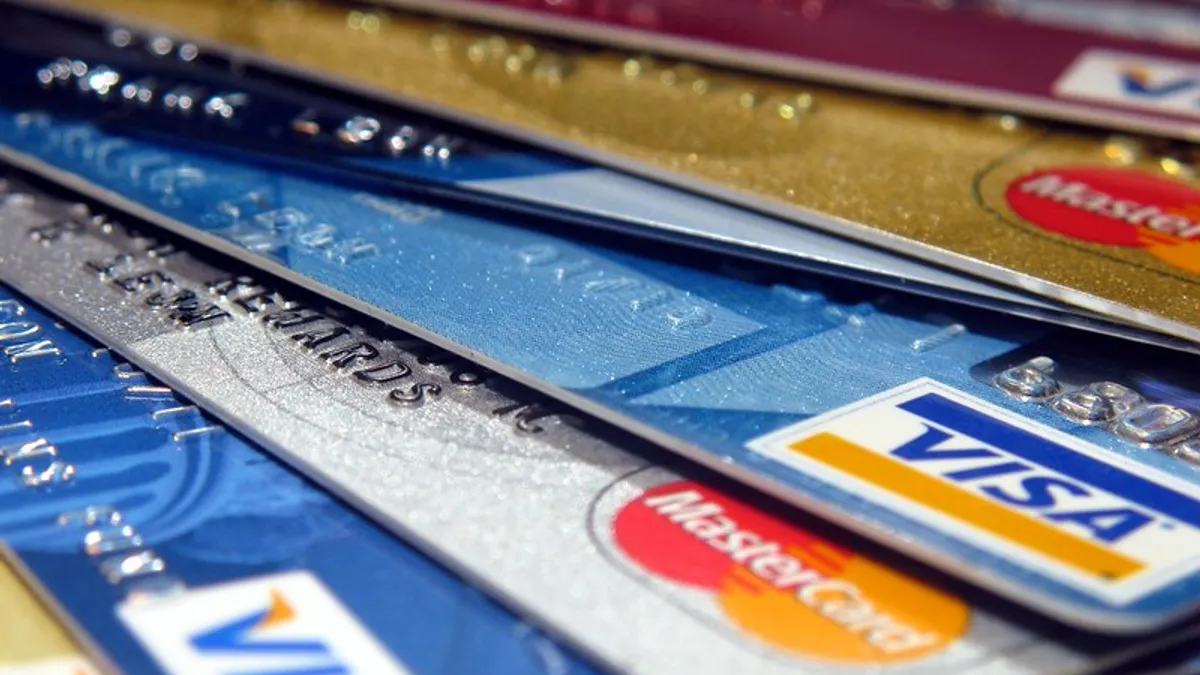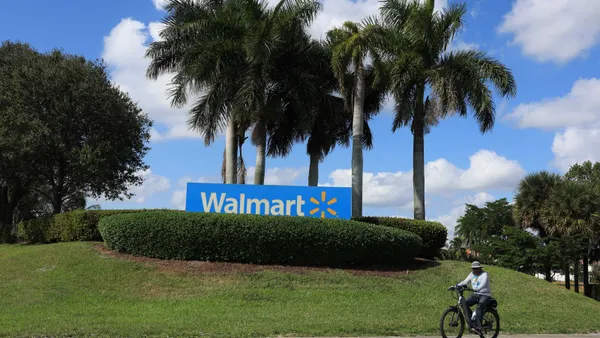Dive Brief:
- Credit card issuers charged $12 billion in late fees in 2020, declining from $14 billion in 2019, although current late fee volume is climbing back to 2019 levels, according to a Consumer Financial Protection Bureau report issued Tuesday.
- Of the top 20 credit card issuers, based on outstanding balances, 18 charged late fees that were at or near the established maximum level of $40 in 2020, according to the report.
- Since those fee limits are adjusted annually for inflation, card issuers are expected to boost their late fees. "Given their current practices, we expect that credit card issuers will hike fees, based on inflation, as limits continue to rise," CFPB Director Rohit Chopra said in the release.
Dive Insight:
The COVID-19 pandemic offered some relief when it came to the amount consumers forked over in credit card late fees, which account for more than half of the credit card market’s consumer fees, the CFPB report said. Prior to the start of the pandemic in 2020, total late fees had been rising steadily, peaking at $14 billion in 2019, per the CFPB.
JPMorgan Chase, American Express, Citicorp, Capital One and Bank of America were the biggest issuers of general purpose credit cards last year, according to a February ranking by industry research firm The Nilson Report based on 2021 purchase volumes.
The drop seen in 2020 was due to record-high payment rates and public and private relief efforts, such as federal stimulus checks, the CFPB said. Between February 2020 and April 2021, late fee volume for accounts of consumers with deep subprime or subprime credit scores dropped 59% and 49%, respectively. For prime and superprime account holders, late fee volume declined by 30% and 23%.
In 2021, however, "total late fee volume was on the rise again," the report noted. Late fee volume grew for all credit score tiers between April and October 2021, and is on the path to return to 2019 levels.
The fact that late fee charges for credit card issuers fell as Americans received stimulus checks in 2020 and 2021 "suggests that late fees are a penalty on households living paycheck-to-paycheck rather than a meaningful incentive to make on-time payments," the report said.
The Credit Card Accountability Responsibility and Disclosure (CARD) Act of 2009 included several cardholder protections, including limits on interest rate increases, late-fee penalties and over-the-limit fees. The Federal Reserve Board of Governors in 2010 voted to implement CARD Act provisions that required penalties be "reasonable and proportional."
Under the new law, a "safe harbor" was set for specific fee amounts, which the CFPB adjusts for inflation on an annual basis. Initially, those limits were $25 for a first late payment and $35 for each subsequent violation within the next six billing cycles. Those limits were raised in January to $30 and $41, respectively.
With inflation at a 40-year high, the CFPB said it expects major card issuers are likely to hike fees further, despite the card companies charging fees near the current maximums already.
Much of the late-fee burden is borne by cardholders in low-income areas of the country; areas with high shares of Black Americans; and areas with lower economic mobility, the CFPB found. Subprime cards and private label cards are especially susceptible to late fee charges.
The average deep subprime account is charged $138 in late fees each year, and those accounts are more likely than super-prime accounts to carry smaller balances, per the report. That means the late fees that deep subprime cardholders pay represent a higher percentage of their balances – 11%, compared to 0.8% for super-prime account holders.
As for private label cards, late fees made up 91% of all consumer fees and 25% of total interest and fees, compared to 45% and 7%, respectively, for general purpose credit cards, the CFPB said.
In a tweet Tuesday, Chopra said the CFPB is "focused on making sure the market works for consumers. The market works best when companies compete on price and service, rather than relying on back-end fees that obscure the true cost." He has previously referred to credit card late fees as "junk fees."
The report mentioned a nascent trend in card issuers limiting or eliminating late fees. For instance, Citibanks’s Citi Simplicity card and the Apple card have moved that direction, but the CFPB said credit cards with no late fees "remain the exception, not the rule."
The report concluded: "As limits increase, late fees’ impact on consumers will likely remain substantial unless something in the credit card market changes."













